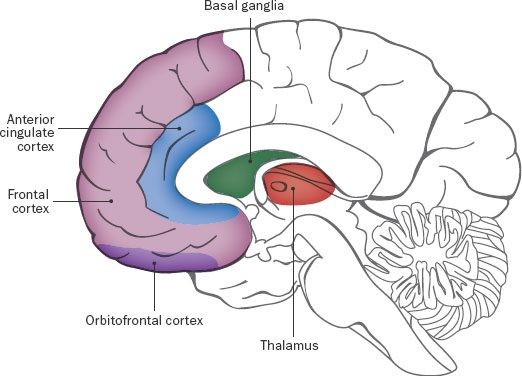Obsessive-Compulsive Disorder (OCD) is a complex condition with no single known cause. The question of whether OCD is genetic or learned, or a combination of factors, is a subject of ongoing research. While there isn’t a definitive answer yet, effective treatments are available. This article delves into the potential causes of OCD, examining the roles of genetics, brain function, neurotransmitters, and environmental influences.
The Complex Interplay of Factors in OCD
OCD likely arises from a combination of factors that vary from person to person. Decades of research point to a multitude of contributing elements, often interacting in complex ways.
Brain Structure and Function in OCD
 OCD Brain
OCD Brain
Brain imaging studies reveal subtle differences between individuals with and without OCD, particularly in areas like the orbitofrontal cortex (OFC), anterior cingulate cortex (ACC), thalamus, and basal ganglia. The OFC influences thoughts, emotions, and gut feelings, while the ACC plays a role in error detection and attention. The thalamus relays sensory and motor signals, and the basal ganglia contributes to planning and executing actions. Overactivity in these regions has been observed in individuals with OCD. However, it remains unclear whether these differences cause OCD or result from the condition.
The Role of Neurotransmitters in OCD
While medications targeting serotonin, such as serotonin reuptake inhibitors (SRIs), can effectively reduce OCD symptoms, this doesn’t confirm a simple “chemical imbalance” as the sole cause. Serotonin likely plays a role, alongside other neurotransmitters like dopamine, glutamate, and GABA. However, the relationship between neurotransmitter function and OCD is more nuanced than a straightforward imbalance.
The Influence of Genetics on OCD
Family studies suggest a genetic component to OCD, with children of affected parents having a 10-20% chance of developing the disorder. However, shared environmental factors and learned behaviors can also run in families. Research indicates that both genetic predisposition and environmental influences contribute to OCD development. Twin studies suggest a stronger genetic influence, but non-shared environmental factors also play a minor role.
Environmental Factors and OCD
While no definitive evidence points to OCD as a solely learned behavior, environmental factors can influence the specific obsessions and compulsions experienced. Cultural, ethnic, sexual, and religious backgrounds can shape the themes of OCD symptoms. Furthermore, societal events, such as the HIV/AIDS epidemic and the COVID-19 pandemic, have been linked to shifts in common obsessional fears.
PANDAS/PANS: A Different Path to OCD
PANDAS (Pediatric Autoimmune Neuropsychiatric Disorders Associated with Streptococcal infections) and PANS (Pediatric Acute-onset Neuropsychiatric Syndrome) represent distinct OCD-related disorders triggered by the body’s response to infections, often strep throat in the case of PANDAS. These conditions differ from typical childhood OCD in their sudden onset and severe symptom presentation. It’s important to note that diagnosing PANDAS/PANS relies on retrospective reporting, making it challenging to definitively establish a causal link between infection and OCD symptoms.
Ongoing Research into the Causes of OCD
Unraveling the complexities of OCD requires continued research. Organizations like the International OCD Foundation (IOCDF) support research efforts through grants and symposiums, striving to pinpoint the precise factors contributing to OCD and how they interact. This ongoing research is crucial for developing more targeted and effective treatments.
Conclusion: The Nature vs. Nurture Debate in OCD
The question of whether OCD is genetic or learned remains unanswered. Current evidence suggests a complex interplay of genetic predisposition, brain function, neurotransmitter activity, and environmental influences. While a definitive cause remains elusive, understanding these contributing factors is vital for developing effective treatments and improving the lives of individuals with OCD.
